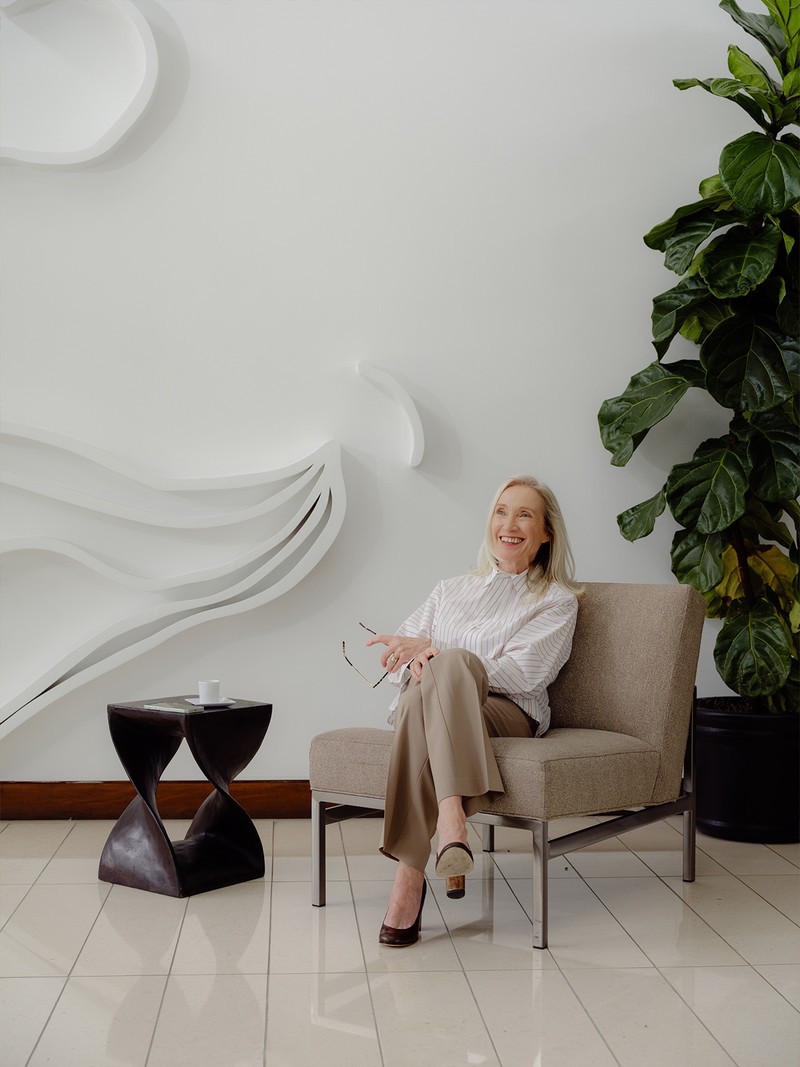
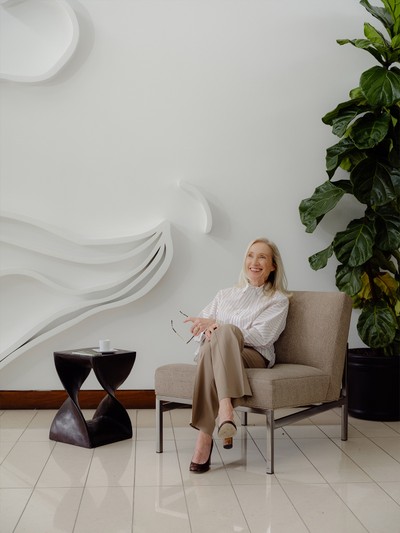
My Business Journey: Caroline Hadfield
I never envisioned myself working in the beauty space. After university I joined the Harrods graduate scheme which was very robust at that time – every eight to ten weeks you joined a different department to learn about all aspects of the business. I leant into fashion because that was where I saw myself ending up but, at the end of the scheme, they put me on boys’ school uniforms – which didn’t feel very fulfilling. At that point I applied for a job at Topshop as an assistant buyer and I was there for many years, working my way up to being a dress buyer and helping them set up other brands within the Burton Group – like Principles.
Later, my husband got a job opportunity in Sydney with Duty Free Shopping. I went with him and, when LVMH ended up acquiring Duty Free, he was involved in some of their early acquisitions – one of which was Sephora. They asked me if I’d like to move to San Francisco to grow Sephora domestically in America. So that’s how I ended up in skincare and cosmetics. We started developing a strategy based around masstige, which meant getting involved with a lot of brands – many of which were up-and-coming indie brands. I was stunned at how much growth we were able to achieve with competitors the size of Proctor & Gamble and Estée Lauder.
After Anita Roddick stepped down from The Body Shop, I stepped in. It meant moving back to the UK, but it taught me so much about the biology of the skin and which ingredients to use and why. Every product The Body Shop sold, they made – unlike Sephora which, at the time, was more focused on just bringing brands into the retail portfolio. We built out new franchises and closed out old ones to try and make the brand more global, and it was a great learning curve to be able to work with chemists so closely in the r&d process.
I was introduced to the CEO of Amyris, John Melo, in 2014 by a board member of The Body Shop. There was no consumer arm to Amyris at the time – it was only a biotech company that had focused on biodiesel before pivoting towards fragrance flavourings and active ingredients. John said they were developing their own ingredients and wanted me to drive the awareness by building an in-house brand for Amyris. I took squalane (which I was familiar with thanks to The Body Shop and its work with olive squalane) and put a structure in place to build Biossance. By this point I had quite a lot of experience in sustainable products. The squalane Amyris was producing was entirely renewable but just as efficacious – which is what the company is all about; there’s never any compromise.
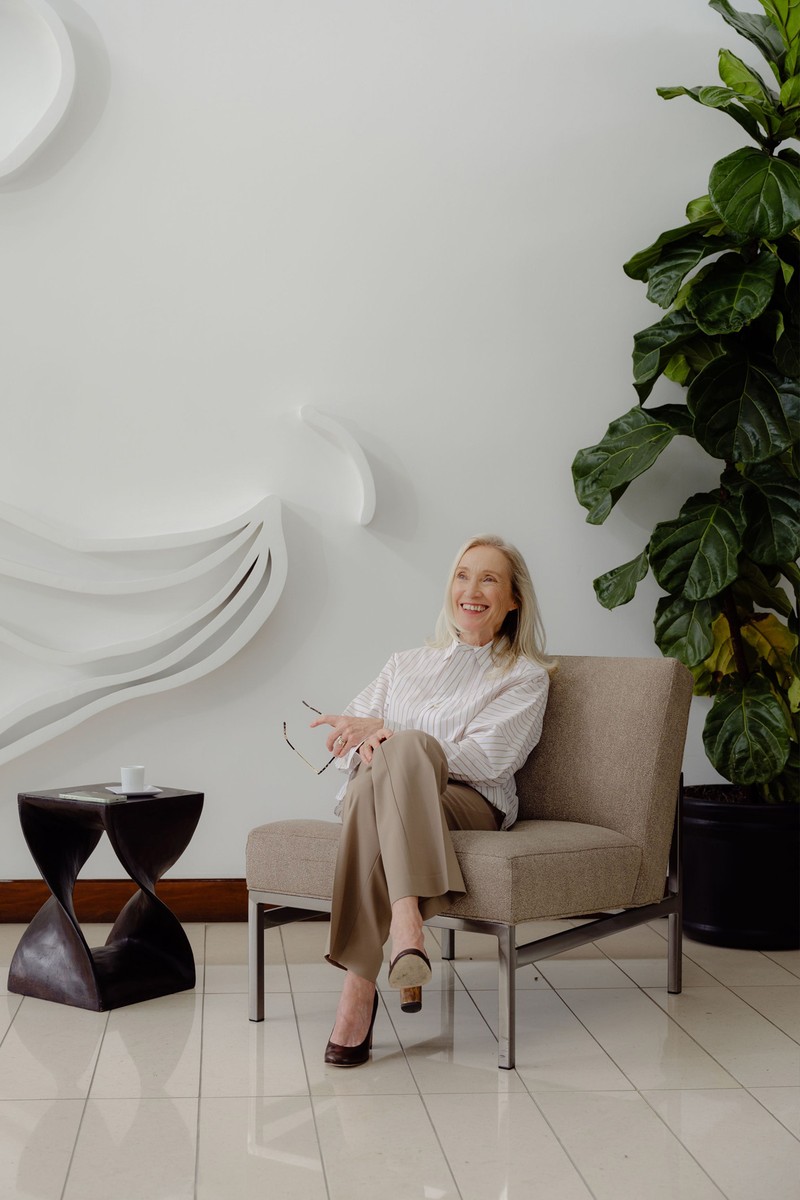
After Biossance, we decided to see if we could replicate that success in an adjacent market. Haircare and baby care were two growing segments – especially after the controversy surrounding companies like Johnson & Johnson and Honest. We spent a lot of time with paediatric dermatologists learning about the soapy fluid that envelops babies when they’re born. About 60% of it is a lipid – and that lipid is squalane. With our squalene and added ceramides, we produced a baby oil that mimics this fluid to really protect children’s skin. This is what started Pipette.
It was through Pipette that I met Rosie Huntington-Whiteley. She was a fan and became an ambassador for the brand after coming to tour the labs. She was really impressed and it was a lovely way to start working with her. Around the same time, she launched the Rose Inc editorial platform and was exploring the idea of launching a make-up brand to go with it. In the background I was already working on colour cosmetics and, in summer 2019, she called me and we agreed to join forces on the Rose Inc brand together. We went down to LA about twice a month to start building out the line – but then everything changed in March 2020.
So much of Rose Inc was built over Zoom. I dread to think how much we spent with Fedex sending samples back and forth. Luckily, our labs were able to keep going through social distancing, so prototyping could continue. Unlike Biossance and Amyris – which are 100% owned by Amyris – we own just under 60% of Rose Inc, so it really is a partnership. In my role as President and CEO, I have to be very global in my approach. I get up early to be able to chat with the UK (which is where Rosie is based now) and then I work through the day with the New York, San Francisco and LA teams. Given everything the world has been through over the last few years, we're naturally a more disparate team now, but I think it works.
A lot of my role is about getting brands up and running. I’m also heavily involved in the innovation side for all three brands, although it’s always the goal to build up a proper management structure so the day-to-day can happen automatically. I think my employees would describe me as a hands-on boss, someone who’s present when they need me to be and more in the background when that feels right. These days, the most important thing is to be responsive as a boss – you have to know how to harness data and turn that into growth, as well as being aware of what’s happening on social media and how you can use that to your advantage. Luckily, I work with quite a lot of young people who are all over this sort of thing; and my own children are also in their early 20s, so they help me keep my finger on the pulse.
/https%3A%2F%2Fsheerluxe.com%2Fsites%2Fsheerluxe%2Ffiles%2Farticles%2F2023%2F03%2Fcaroline-hadfield-image-5.jpg?itok=7ucdNw-C)
A successful brand launch is a 360° thing. Last summer, we did a Rose Inc pop-up in Covent Garden in partnership with Space NK where Rosie did masterclasses with professional make-up artists and we invited a lot of influencers, editors and the general public. Its success was measured in several ways: revenue, conversion and subscriber sign-ups. All three were really strong – helped in no part thanks to wide press coverage and influencer marketing. Reach and awareness converts strongly for us, so it’s these things we’re always focused on when it comes to launches or PR events.
These days, a lot of beauty is about direct to consumer. It’s not enough to be in retailers, no matter how prestigious. You have to build a direct conversation with customers and form a relationship with them that goes beyond the product. You want them to feel like they’re investing in an ethos, a value system, even a lifestyle to some degree. We didn’t wait long to launch the Rose Inc direct to consumer site. We could see we had a lot of traffic coming directly to the US site, but people weren’t purchasing because of the import fees – so we set about creating our own UK site for them to be able to engage with us as soon as it was feasible, so everything was frictionless.
The other thing you need to realise is that consumers have never been more knowledgeable. They are so educated about ingredients, sustainability and even things like packaging. They’re interrogative and want to keep their make-up streamlined and simple. We’re all much more conscious of how much we buy these days, too, so I don’t believe women want to buy hundreds of products to find something that works. It’s much easier to tell when a brand is cutting corners – or equally when the price is inflated based on the quality of ingredients used. No one wants – or needs – to spend £100 on a moisturiser anymore if they know what ingredients to look for.
One of the best pieces of advice I have for women in business is to stay curious. Even this weekend, I dragged my husband to go and have a look at the Glossier stand in Sephora because I was curious to see how they’d done it. Glossier is obviously aimed at much younger customers, but I was still keen to see the choices they’d made given they too are a largely direct-to-consumer brand. You have to be present in your industry to rise to the top, and I’m always popping into beauty stores to keep my eye on the competition. My second piece of advice would be to listen to your team. Get their opinion on where the brand should go next – you might be surprised at what you hear. Experience should always be balanced by youth and fresh perspectives.
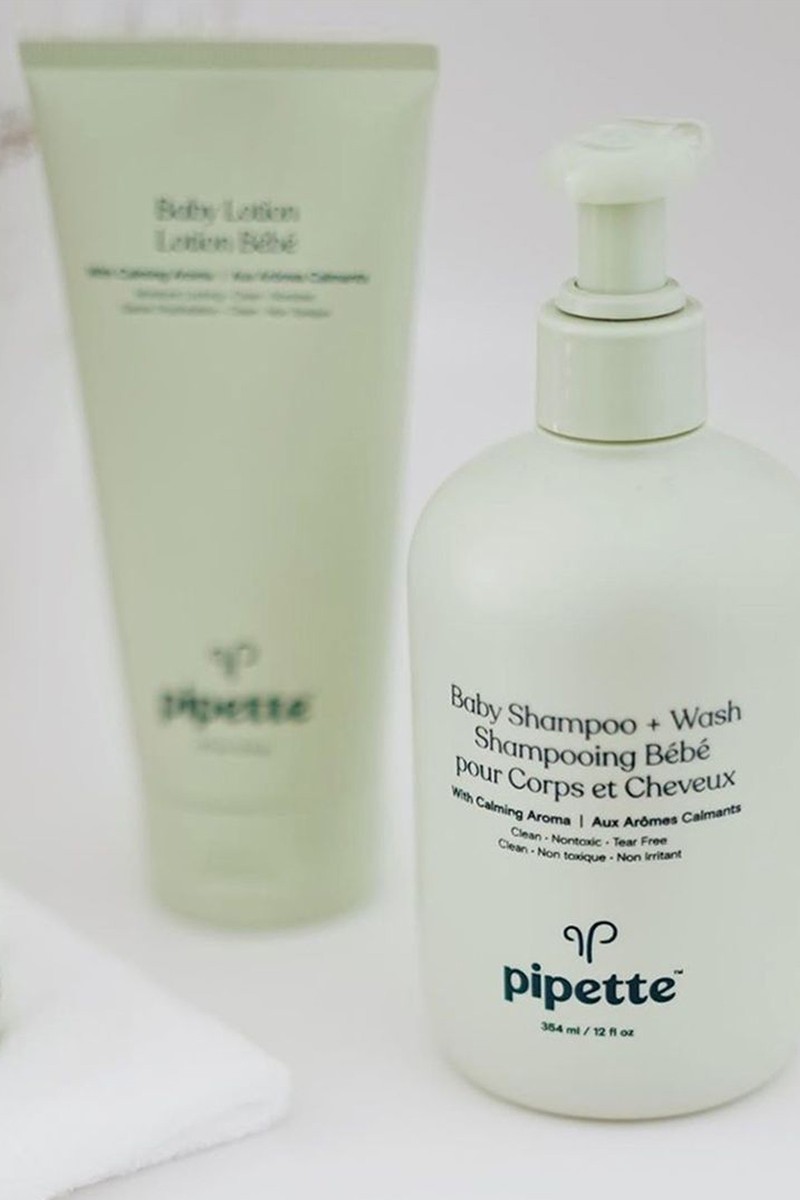
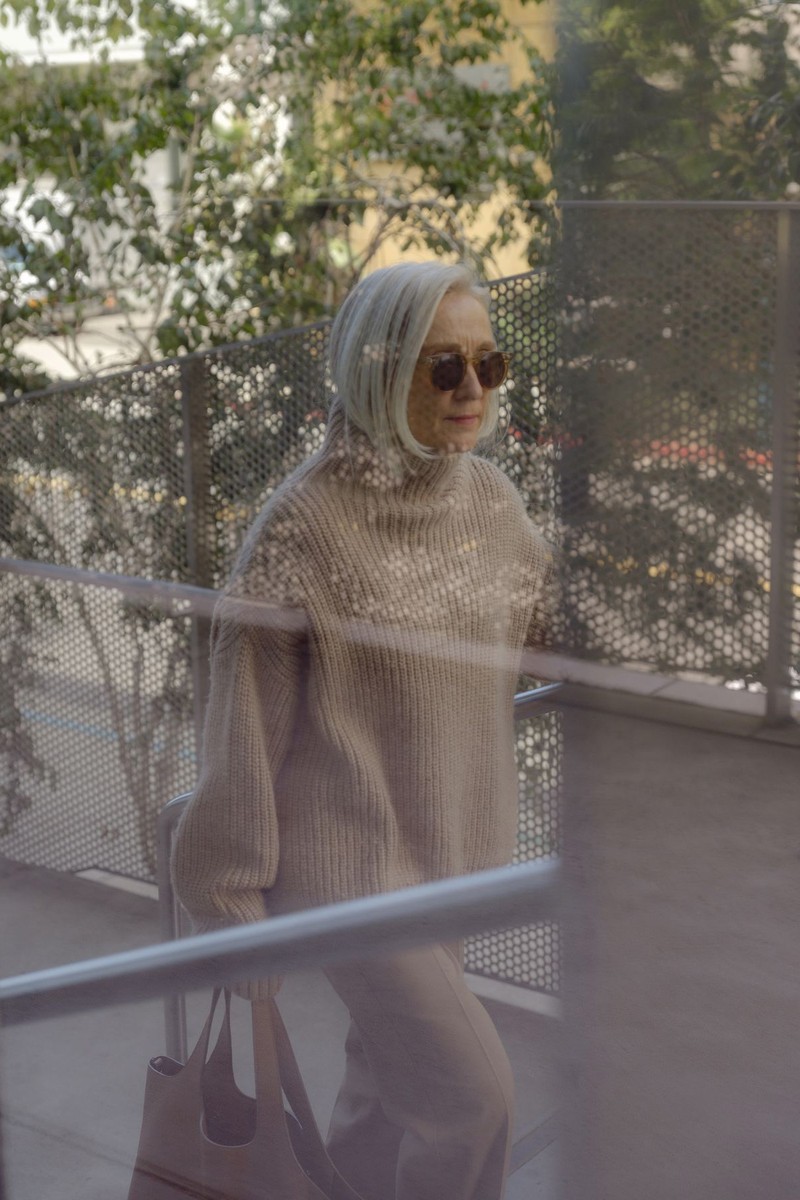
Anita Roddick was a big influence on me. She was always so adamant about not using ingredients for the sake of it. For example, their iconic body butters were always named after things like Brazil nuts or sesame oil – and she was outraged when someone suggested doing a strawberry body butter. “What moisturising agents do strawberries have?” I remember her asking, incredulously. So, I’ve always thought it’s important not to bring any ideas – especially around ingredients – to the table that aren’t going to be 100% efficacious or exact. Everything you design should deliver on results, price and value. That’s the bottom line, and authenticity is the only way to achieve that – otherwise people see right through you.
Trust your team to build the business. That’s another really good tip. As companies grow, it’s inevitable that people who work for you will want to bring in people to work for them – and you have to trust them to hire the right people. It’s the only way teams will develop and it’s important that the founding members feel like they’re developing. Remember, all boats float in a rising tide.
Any women wanting to get back into work should try to find the right re-entry point for them. I took time out when my girls were about three and five in order to be more present with them as they started school. I set up my own business with my husband at the time, which gave us more flexibility, but it also meant I could keep my hand in. I decided to go back into the corporate world when my children went off to university, but I admit it took a couple of years to find the right re-entry point – eventually with Amyris. It’s about having a point of view, reviewing the skills you can bring to the table and how that might be valuable to someone. I think consultancy is a great way to go because you can really lean in and out of several industries and businesses.
Balance is important when you work this hard. Exercise and music are my two passions, so I make sure I carve time out for both to get some perspective. I also take pleasure in the smallest of things – like singing in the car on the way to work – as well as going to gigs with my daughter or something like that. They’re memories and they’re the things that stay with you.
Visit Amyris.com, RoseInc.co.uk, Biossance.com & PipetteBaby.com
DISCLAIMER: We endeavour to always credit the correct original source of every image we use. If you think a credit may be incorrect, please contact us at info@sheerluxe.com.

